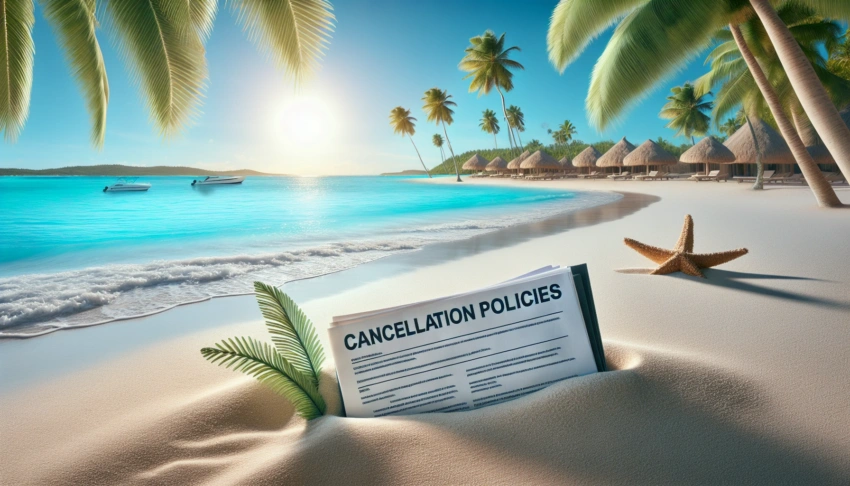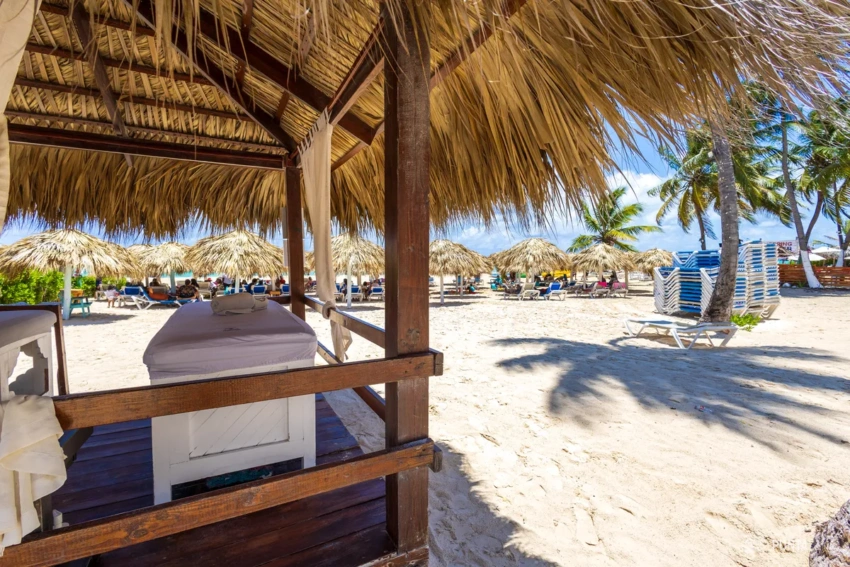Understanding Cancellation Policies in Punta Cana: Protecting Your Investment
Introduction to Cancellation Policies in Punta Cana

Understanding Cancellation Policies in Punta Cana: Protecting Your Investment
When planning a trip to Punta Cana, understanding cancellation policies is crucial. These policies are not just small print details—they play a pivotal role in safeguarding your travel investment.
1. Why Cancellation Policies Matter
Traveling is an exciting yet significant investment, and cancellation policies serve as a protective measure against unforeseen circumstances. They are crucial in avoiding unexpected costs such as non-refundable deposits or last-minute cancellation fees. For instance, a sudden illness or an unexpected work commitment could derail your plans, and without a thorough understanding of cancellation policies, travelers might find themselves financially penalized.
Peace of mind is another key benefit. Knowing the specifics of these policies allows travelers to plan with confidence, assured that they have a safety net. For instance, choosing accommodations or tours with flexible cancellation policies can offer the freedom to make changes without financial repercussions, thereby enhancing the overall travel experience.
2. Common Types of Cancellation Policies
Travelers to Punta Cana will encounter a variety of cancellation policies, each with its own set of rules and conditions. Here’s an overview of the most common types:
- Non-refundable Policies: These are typically associated with lower-cost bookings. In exchange for a discounted rate, the consumer agrees to forfeit any refunds should they need to cancel.
- Flexible Policies: Offering more leniency, these allow changes and cancellations within a certain time frame, often up to 24 hours before the scheduled event or stay without incurring charges.
- Partial Refund Policies: A middle ground where a portion of the payment is refundable, depending on how far in advance the cancellation is made.
Choosing the right policy depends on your travel needs and plans. For instance, if your itinerary is subject to change, a flexible policy is advisable. In contrast, if your plans are set in stone, a non-refundable option might be more economical.
3. How to Find Cancellation Policy Information
Finding the right cancellation policy information is essential for informed decision-making. Here are some tips to assist you:
- Direct Sources: Always start by checking the official website of your accommodation or service provider. Most reputable establishments will have their cancellation policies clearly outlined on their booking pages.
- Booking Platforms: Websites like Expedia, Booking.com, and Airbnb offer detailed cancellation policy information during the booking process. Always look for sections labeled ‘Cancellation Policy’ or ‘Terms and Conditions.’
- Customer Service: If the online information is unclear, contact the provider directly. A quick phone call or email can clarify any uncertainties you might have about cancellation terms.
Understanding cancellation policies is not just about reading the fine print—it’s about making informed choices that protect your travel investment. By taking the time to understand these policies, travelers can avoid potential pitfalls and ensure a stress-free experience.
Navigating Hotel Cancellation Policies

Punta Cana
Navigating the complexities of hotel cancellation policies in Punta Cana is crucial for safeguarding your travel investment. These policies can significantly influence your travel plans, making it essential to understand their intricacies before booking accommodations.
To make informed decisions, it is vital to comprehend the various elements of hotel cancellation policies, which can range from understanding specific terms and conditions to choosing between flexible and non-refundable rates. Moreover, recognizing the differences in policies across booking platforms can help you avoid unexpected costs and ensure a more relaxed travel experience.
1. Understanding Hotel Terms and Conditions
Hotel cancellation policies are often detailed and can vary widely between establishments. Key terms and conditions typically include deadlines for cancellations, fees that may apply, and any exceptions to these rules. For example, many hotels offer a free cancellation period, often up to 24 to 48 hours before the check-in date. However, this is not universal, and some hotels may require notice several days or even weeks in advance.
Fees associated with cancellations can also differ. Some hotels may charge a flat fee, while others might require payment for one night’s stay if the cancellation is made after the stipulated period. It’s also essential to be aware of any exceptions, such as cancellations due to unavoidable circumstances like natural disasters or health emergencies, which may be treated more leniently.
2. Flexible vs. Non-refundable Rates
When booking a hotel in Punta Cana, travelers are often presented with a choice between flexible and non-refundable rates. Understanding the differences between these options is crucial for making a decision that aligns with your travel preferences and risk tolerance.
Flexible rates provide the advantage of modification or cancellation without a penalty, offering peace of mind particularly in uncertain times. However, this flexibility usually comes at a higher price. On the other hand, non-refundable rates are often more economical but come with the significant drawback of losing the full payment if you cancel.
Comparison of Flexible vs. Non-refundable Hotel Rates
| Feature | Flexible Rates | Non-refundable Rates |
|---|---|---|
| Price | Higher | Lower |
| Cancellation | Allowed, often without fees | Not allowed, full charge applies |
| Modification | Usually permitted | Typically not permitted |
| Risk | Low | High |
3. Booking Platforms and Their Policies
The platform you use to book your hotel can significantly impact the cancellation policies that apply to your reservation. Direct bookings through a hotel’s website often provide the most transparent and flexible cancellation options. Hotels may also offer exclusive deals or perks to direct bookers, such as free upgrades or additional amenities.
In contrast, third-party booking sites like Expedia or Booking.com might offer competitive rates but come with their own set of cancellation rules. These platforms often have a blanket policy that applies to most bookings, which may not always align with the hotel’s direct policy. Thus, it’s crucial to read the fine print and understand both the hotel’s and the booking platform’s policies before finalizing your reservation.
By taking the time to navigate hotel cancellation policies effectively, travelers can avoid unforeseen costs and ensure a more secure investment in their Punta Cana accommodations.
Our Best Hotel Options in Punta Cana
Explore our exclusive selection of hotels in Punta Cana, offering a range of flexible and non-refundable rates to suit every traveler’s preferences. Whether you seek luxury or affordability, our curated list ensures a perfect match for your next getaway.

Event Venue for Rent in Bavaro Beach, Punta Cana
from $2000 night Read more
Quiet and Cozy Family Apartments for Rent - Directly on the Bavaro Beach, Punta Cana
from $199 night Read more
Amazing Lakeview 4BR Apartment in Secure Cocotal Community, Punta Cana
from $119 night Read more
Secure & Private 2 BR Apartment for Rent in Cocotal, Punta Cana
from $99 night Read moreAirline Cancellation Policies and Travel Insurance
Understanding the intricacies of airline cancellation policies and the protective role of travel insurance is crucial to safeguarding your travel investment. This section illuminates these aspects, ensuring you are prepared for any unexpected changes to your travel plans.
1. Understanding Airline Cancellation Rules
Airline cancellation policies can vary significantly, and having a clear understanding of them can save you from unexpected costs. Typically, airlines outline their cancellation rules in terms of change fees and refund eligibility. Most airlines have a window — often 24 hours after booking — during which you can cancel without penalties. However, outside this period, change fees might apply, and these can range from modest amounts to substantial fees, depending on the class of your ticket.
Moreover, the type of ticket you purchase plays a crucial role. Economy tickets often have the most stringent rules, while business and first-class tickets may offer more flexibility. It’s advisable to read the airline’s specific cancellation terms before booking. Some airlines also offer refundable ticket options, albeit at a higher initial cost, which can be a smart investment if your travel plans are uncertain.
2. How Travel Insurance Can Help
Travel insurance serves as a safety net, providing coverage for cancellations and other disruptions. A comprehensive travel insurance policy can cover trip cancellations, delays, and even medical emergencies. When selecting travel insurance, ensure that it covers the specific risks you are concerned about, such as natural disasters, personal emergencies, or pandemics.
An important aspect of travel insurance is the “Cancel For Any Reason” (CFAR) clause. This optional upgrade allows you to cancel your trip for reasons not covered in standard policies and receive partial reimbursement, typically around 50-75% of your costs. While it increases the premium, CFAR provides unparalleled flexibility and peace of mind.
3. Dealing with Flight Cancellations and Rescheduling
Experiencing a flight cancellation can be frustrating, but knowing how to handle it can mitigate stress. First, check if your flight qualifies for a refund or free rescheduling. Many airlines provide digital tools or apps that allow you to rebook directly, avoiding long wait times on customer service lines.
If your flight is canceled, airlines are often obligated to offer alternatives, such as rebooking on the next available flight, full refunds, or travel vouchers. It’s wise to be aware of your rights as a passenger, as these can vary between airlines and countries. In the U.S., the Department of Transportation mandates that passengers are entitled to a refund if the airline cancels a flight, regardless of the reason, and the passenger decides not to travel.
For added protection, keep records of all communications and transactions related to the cancellation. This documentation can be invaluable if you need to resolve disputes or engage with travel insurance providers.
Navigating airline cancellations with a strategic approach and the support of travel insurance ensures that your travel plans remain secure, no matter the circumstances.
Excursion and Activity Cancellations
When planning a dream vacation to Punta Cana, excursions and activities often top the list of must-dos. However, understanding cancellation policies for these activities is essential to ensure your itinerary remains flexible and stress-free.
1. Typical Cancellation Policies for Tours
In the vibrant landscape of Punta Cana, excursions range from serene beach outings to adrenaline-pumping adventures. Each comes with its own cancellation policy, which largely depends on the provider and the nature of the activity. Generally, tour operators offer a 48 to 72-hour cancellation window for a full refund. This means you can cancel up to a few days before the scheduled activity without incurring penalties. However, it’s important to note that some exclusive or limited-capacity tours may have stricter policies with shorter notice periods.
Comparison of Common Tour Cancellation Policies
| Type of Tour | Cancellation Notice Period | Refund Availability | Special Conditions |
|---|---|---|---|
| Standard Beach Excursion | 48 hours | Full refund | N/A |
| Adventure Activity | 72 hours | Partial refund if within notice | Weather-dependent |
| Cultural Tour | 24 hours | Full refund | Non-refundable during peak seasons |
| Private Charter | 7 days | Full refund if canceled early | Deposit non-refundable |
2. Last-minute Cancellations and No-shows
Unexpected events can sometimes lead to last-minute cancellations or no-shows. In Punta Cana, last-minute cancellations may result in partial refunds or none at all, depending on the tour operator. For instance, if you cancel an hour before a scheduled excursion, you might forfeit the entire amount. No-show policies are typically stricter, with most operators offering no refunds unless a valid reason is provided and accepted.
To mitigate such risks, consider purchasing travel insurance that covers unforeseen circumstances leading to cancellations. This can offer peace of mind and financial protection, especially for high-cost activities.
3. Booking Directly vs. Through Agencies
When booking excursions, travelers often face the choice between booking directly with the provider or through a travel agency. Each option has its own set of advantages and challenges regarding cancellation policies.
Booking directly with providers can sometimes offer more flexibility in terms of cancellation terms. Providers may be more willing to accommodate changes or offer personalized solutions. Conversely, booking through a travel agency can provide added layers of protection and advocacy, especially if the agency has strong relationships with local operators.
Ultimately, the choice depends on your personal preference for handling bookings and changes. Understanding the nuances of each option can help you make an informed decision that best suits your travel needs.
Section 5: Tips for Managing Cancellations and Changes
When traveling to a destination like Punta Cana, having a keen understanding of how to manage cancellations and changes can make a significant difference in ensuring a seamless travel experience. These tips are designed to help you navigate such situations with ease, saving both time and money.
1. Keeping Track of Important Dates
A proactive approach to tracking important dates can safeguard you against unnecessary penalties. It’s crucial to be aware of cancellation deadlines, refund eligibility periods, and any specific terms that may apply to your bookings.
- Set Calendar Reminders: Use digital calendars like Google Calendar to set reminders a few days before critical cancellation deadlines. This will ensure you have ample time to make decisions without incurring charges.
- Maintain a Travel Itinerary: Keeping an organized itinerary with all your booking details, including confirmation numbers and dates, can help you stay on top of your schedule and avoid missing any key deadlines.
- Regularly Review Booking Policies: Policies can change, so it’s wise to periodically review the cancellation terms of your bookings, particularly if you made reservations well in advance.
2. Communicating with Service Providers
Effective communication with service providers is pivotal when managing cancellations or changes to your travel plans. Establishing clear and open lines of communication can lead to more favorable outcomes.
- Contact Providers Early: If you foresee a need to cancel or change your plans, reach out to service providers as soon as possible. The earlier you communicate, the more options you’ll likely have.
- Be Clear and Concise: When explaining your situation, provide clear and concise information. Include relevant details such as booking numbers and original travel dates to facilitate a quicker and more efficient process.
- Request Written Confirmation: After any changes or cancellations are agreed upon, request a written confirmation via email. This serves as a record of the agreement and protects you in case of any discrepancies.
3. Using Technology to Your Advantage
In today’s digital age, technology offers numerous tools to help manage your travel plans, making modifications and cancellations more streamlined.
- Leverage Travel Apps: Apps like TripIt and Kayak not only help organize your travel plans but also alert you of any changes to your itinerary, ensuring you’re always in the loop.
- Utilize Airline and Hotel Apps: Many airlines and hotels have their own apps that allow you to easily modify bookings, check cancellation policies, and receive updates in real-time.
- Consider Automation Tools: Tools like IFTTT (If This Then That) can automate reminders and notifications for important travel deadlines, simplifying the management of your bookings.
Our Best Villa Rentals in Punta Cana
Explore our exclusive villa rentals in Punta Cana, offering flexible booking options to accommodate your travel needs. Whether you’re planning a last-minute getaway or a well-organized vacation, our villas provide the ultimate in comfort and convenience.

Huge Luxury Cap Cana (Las Palmas) Golf Villa for Rent - Chef, Butler, Maid, 2 Golf Carts, Jacuzzi, Semi-Olympic Pool
from $3744 night Read more
Brand-New Oceanfront Luxury Cap Cana 10BR Villa - Private Beach, Full Staff, Home Theater
from $8237 night Read more
New Bávaro Beach Beachfront Condo for Rent - Stunning Ocean View, Housekeeper & Rooftop Terrace
from $811 night Read more
Luxurious 5-bdr Villa at Casa de Campo - With Pool, Jacuzzi, Games, Hibachi Grill, Staff
from $1685 night Read moreConclusion: Safeguarding Your Travel Investment
As you embark on your journey to Punta Cana, understanding cancellation policies is crucial to ensuring your travel experience is as seamless and enjoyable as possible. With a solid grasp of these policies, you can protect your investment and enjoy peace of mind.
1. Recap of Key Takeaways
Throughout this article, we’ve explored the importance of understanding cancellation policies to avoid unexpected costs and ensure a smooth travel experience. From learning about the differences between flexible and non-refundable rates to understanding the intricacies of airline and tour cancellation policies, each section provided valuable insights into how these policies can affect your travel plans. Moreover, we discussed how booking platforms can influence cancellation terms, and the role of travel insurance in safeguarding against unforeseen disruptions.
2. Encouragement to Stay Informed
Staying informed about cancellation policies is not just a precautionary measure; it is an essential part of responsible travel planning. Being aware of potential pitfalls and having a strategy in place can save you time, money, and stress. We encourage you to regularly review and understand the specific terms and conditions of each booking, whether it’s a hotel, flight, or activity. Utilize resources such as travel apps and websites that provide up-to-date information on cancellation policies.
3. Final Thoughts on Travel Planning
In conclusion, understanding cancellation policies is pivotal to enhancing your overall travel planning and experience. By being proactive and informed, you not only protect your travel investment but also ensure a more flexible and enjoyable journey.
Remember that every traveler’s needs are different, and what works for one person may not work for another. Tailor your approach to cancellation policies based on your unique circumstances and preferences. This personalized planning will not only safeguard your trip but also allow you to embrace the adventure that awaits in Punta Cana with confidence.
Frequently Asked Questions
What should I look for in a cancellation policy when booking in Punta Cana?
When reviewing a cancellation policy, ensure you understand the terms regarding cancellation fees, refund eligibility, notice period required for cancellation, and any non-refundable deposits. It’s also important to check if there are any special conditions or exceptions, such as changes in travel restrictions due to global events.
Are cancellation policies the same for all accommodations in Punta Cana?
No, cancellation policies can vary significantly between different accommodations in Punta Cana. Hotels, resorts, and vacation rentals may each have unique terms. Always read the specific policy for your chosen accommodation carefully before booking.
How can I protect my investment when booking a trip to Punta Cana?
Consider purchasing travel insurance that covers cancellations. This can provide peace of mind in case you need to cancel unexpectedly. Additionally, choose accommodations with flexible cancellation policies that allow for refunds or rebooking options.
What are the typical cancellation fees for accommodations in Punta Cana?
Cancellation fees can range from a small percentage of the booking cost to the entire amount, depending on how close to the check-in date you cancel. Some places may offer a full refund if cancelled within a specified timeframe, while others might have a tiered fee structure based on timing.
How do cancellation policies affect refunds for activities and tours in Punta Cana?
Like accommodations, tours and activities may have their own cancellation policies. Some may offer full refunds if cancelled within a certain number of days, while others might be non-refundable. It’s crucial to read these policies carefully and consider their impact on your overall travel plans.
Can I negotiate the cancellation terms with my accommodation in Punta Cana?
While not always possible, some accommodations may be open to negotiating terms, especially if you’re booking well in advance or during off-peak seasons. It never hurts to ask if there are more flexible options available.
What happens if I need to cancel my trip to Punta Cana due to unforeseen circumstances?
If you have travel insurance, check your policy to see if it covers the reason for your cancellation. If not, review the cancellation policy of your accommodation or activity provider to understand any potential penalties or refunds. Communicate with them as soon as possible to explore your options.
How can I ensure I understand the cancellation policy before booking?
Before confirming your booking, read the cancellation policy carefully. If anything is unclear, contact the accommodation or service provider for clarification. Make sure to keep a copy of the policy for your records in case you need to reference it later.
Are there any legal protections for travelers regarding cancellation policies in Punta Cana?
While there may be consumer protection laws applicable, these can vary. It’s best to review the specific terms of your agreement and consider purchasing travel insurance for additional protection.
Always consult with a legal expert if you need advice regarding your rights in a specific situation.
